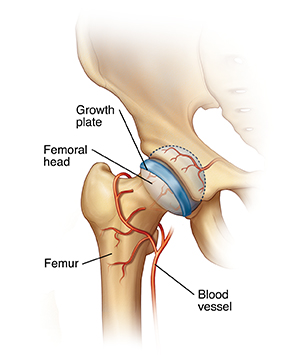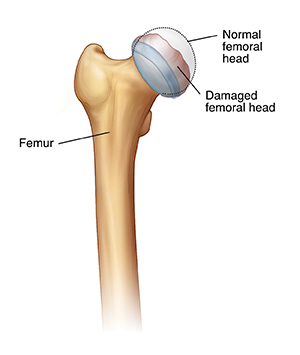When Your Child Has Legg-Calvé-Perthes Disease
Your child has been diagnosed with Legg-Calvé-Perthes (LCP) disease. It is a problem with the head of the thighbone (femoral head). The femoral head is the ball-like part of the bone that fits into the hip socket. With LCP disease, the blood supply to the femoral head stops. The reason for this is unknown. As a result, the femoral head becomes weak, and a portion of it dies (avascular necrosis).
LCP disease can be serious with, but it can be treated. Your child may see an orthopedist for evaluation and treatment. This is a health care provider who diagnoses and treats bone, muscle, and ligament problems.
 |
| In a normal hip joint, the femoral head is smooth and round. |
 |
| With LCP disease, the femoral head is damaged and loses its normal shape. |
What causes LCP disease?
It is unknown why blood flow to the femoral head stops.
Boys ages 4 to 8 years are most likely to develop LCP disease. It may also run in some families.
What are the symptoms of LCP disease?
Symptoms of LCP disease include:
-
Achy pain in the groin, hip, or knee (knee pain happens when the pain from the hip travels to the knee).
-
Loss of range of motion (movement) in the hip.
-
Walking with a limp. The limp is often easier to see after activity. And it may be painless.
-
Groin, hip, or knee pain while resting.
-
Shrinking of the muscle in the thigh or buttock.
How is LCP disease diagnosed?
The health care provider will ask about your child’s health history and examine your child. They will check for a limp, stiffness in the hip, and for loss of motion.
An X-ray will be done.
An MRI and CT scan may also be done. These are tests that take images of the inside of the body. They help the provider correctly diagnose the condition.
How is LCP disease treated?
The health care provider will talk with you about the best treatment plan for your child. As instructed, your child should:
-
Rest from sports and exercise. The provider will tell you when it is safe for your child to resume activities.
-
Take anti-inflammatory medicine, such as ibuprofen, as directed.
-
Wear a cast or brace to support the leg while it heals. (This treatment is used for very young children.)
-
Use crutches or a walker, if instructed.
-
See a physical therapist (PT) for a supervised program of exercises. Your child’s physical therapist or provider may also ask your child to do strengthening exercises at home.
Some injuries require surgery. Your child’s provider will talk with you about surgery if it's needed.
What are the long-term concerns?
The amount of damage done to the femoral head also affects the outcome. If able to heal, it often takes 2 to 3 years for the femoral head to repair.
In more severe cases, the femoral head dies and collapses. This condition is called avascular necrosis. If it collapses and loses its round shape, some loss of range of motion and a limp will result.
Arthritis in the hip joint later in life is also a concern with LCP. The health care provider can tell you more about your child’s condition.